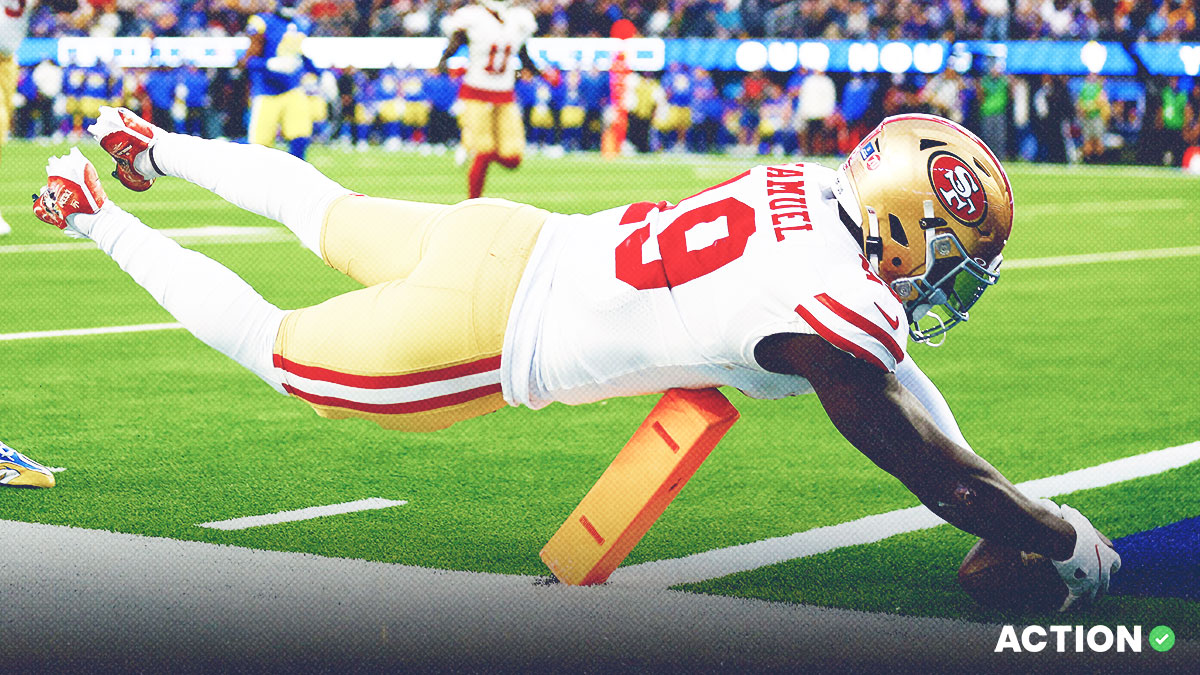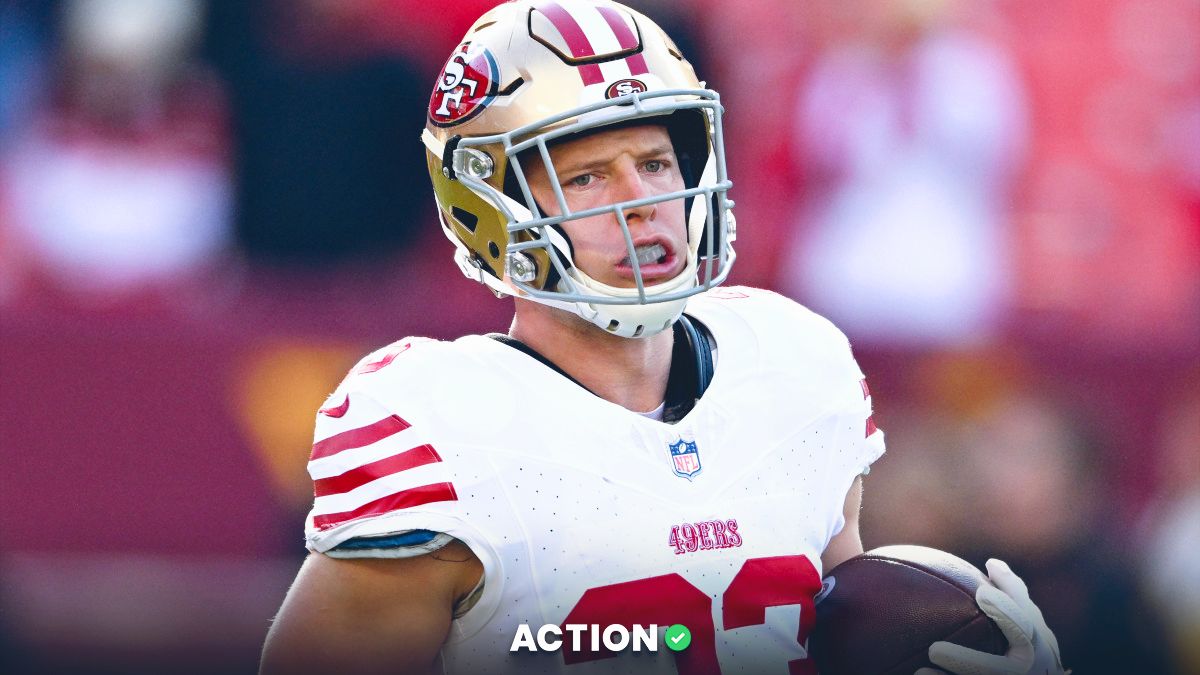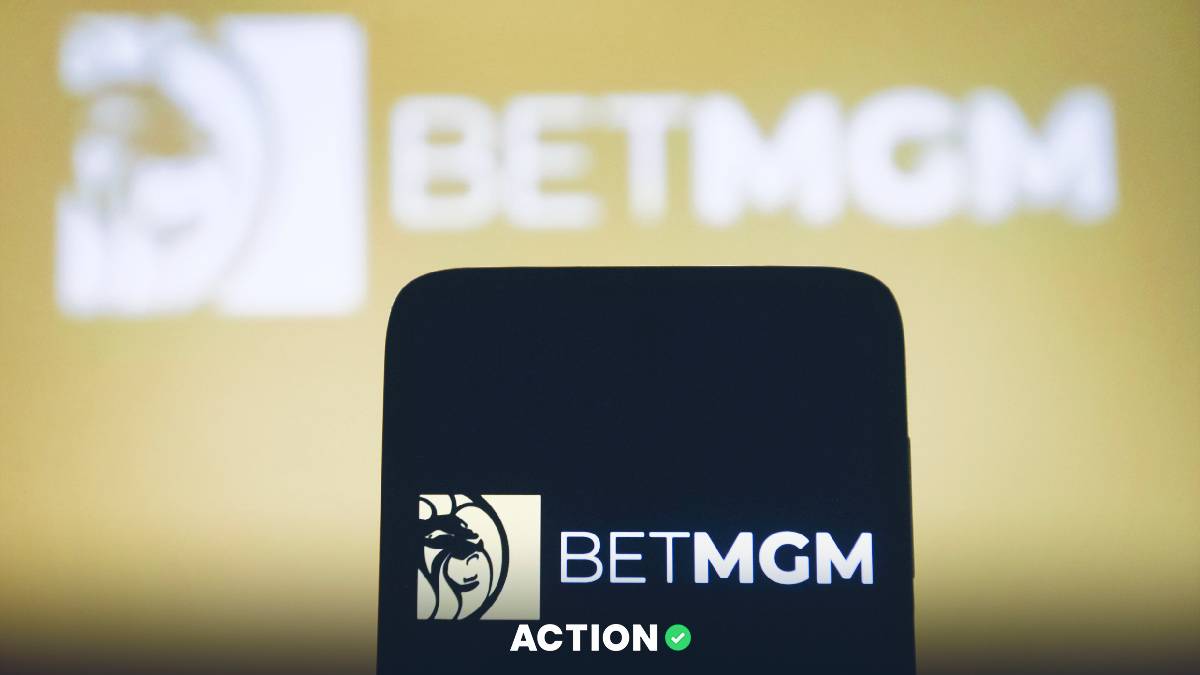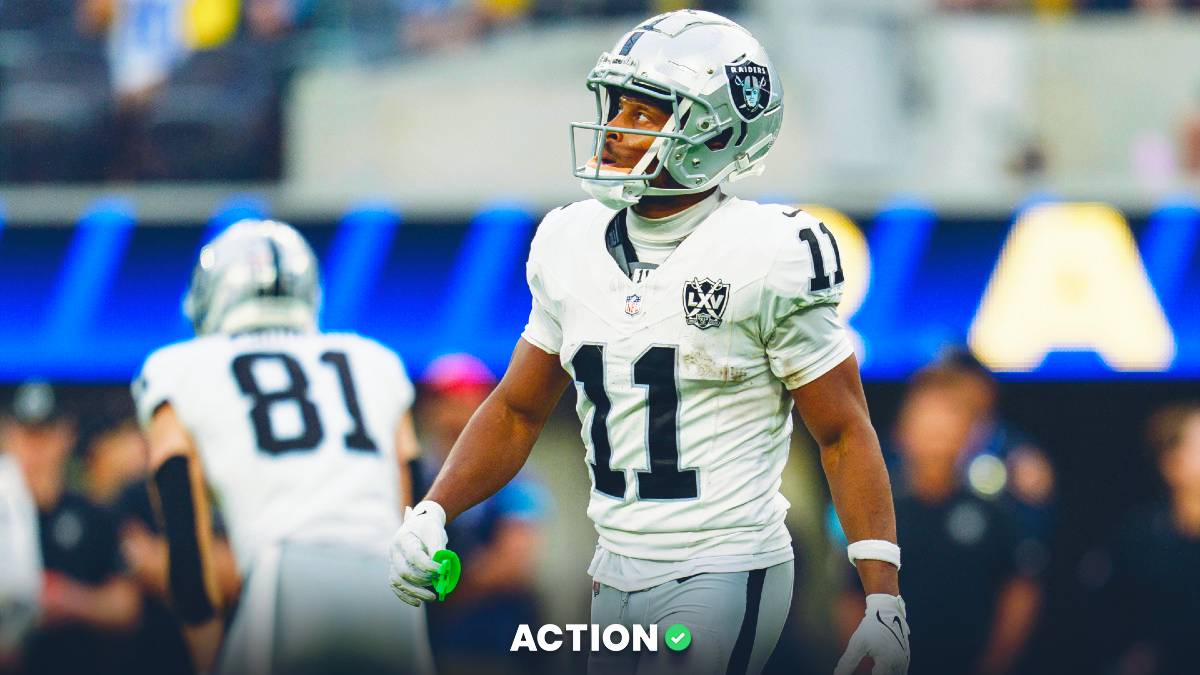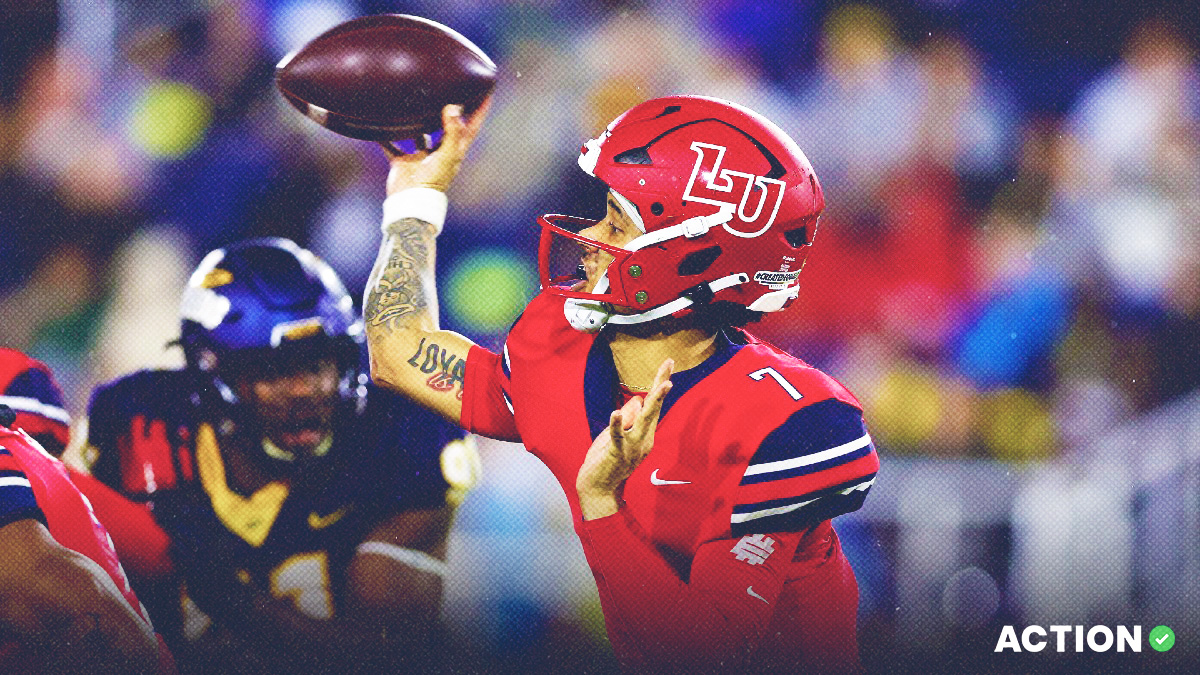When you bet a golfer (and other sports) at some United States sportsbooks, you may see a little box next to his or her name.
"Each Way" or "E/W", followed by a fraction and some numbers.
This is a popular betting concept in Europe, but hasn't quite become mainstream in the U.S. yet. It's used most often in golf, but it also applies to other sports with big fields, like motor sports or horse racing.
bet365 is one of the only United States books to offer each-way betting. BetRivers also offers them, but calls it a "Win/Place" bet.
Each Way Definition
An each-way bet just splits your bet into a "win" bet and a "place" bet — for golf, that means the sportsbook will make half your bet on the player to win, and half for them to finish top 5 (or sometimes top 4 or top 8). In many cases, it's the same thing as betting a player to win and finish top 5, just with one bet/click instead of placing two separate bets.
So if you bet $20 total on a golfer each-way, you're getting $10 on him to win the tournament and $10 on him to finish top 5 at a smaller payout.
Need a more basic explainer of how to bet on sports as a beginner?
Each Way in the Bet Slip, Explained
When looking at this bet type in your bet slip, there are three key elements to the each-way.
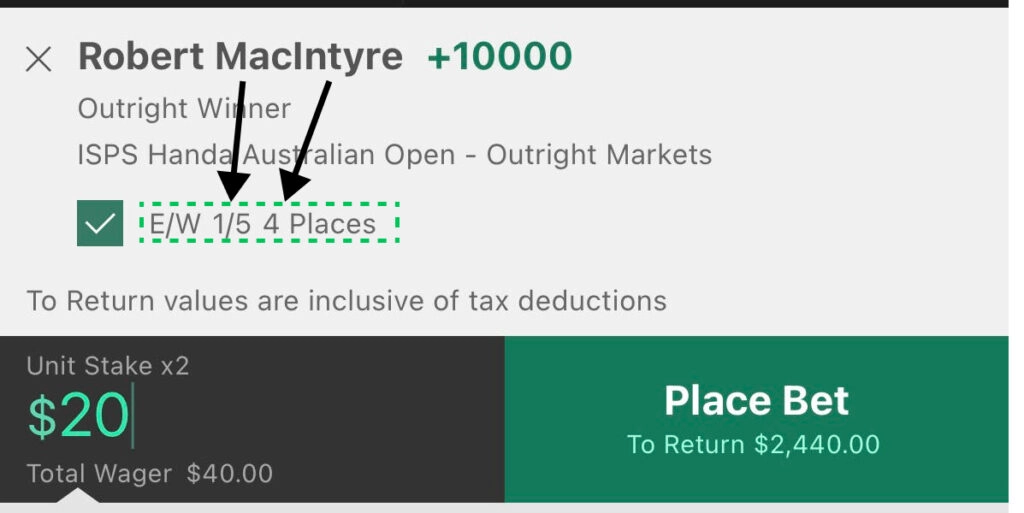
- The number of places (4 in this case): Where golfer has to finish to cash the each-way portion of the bet.
- The fraction, which determines the payout (1/5 in this case): If the odds for the player to win are 100-1 like the screenshot above, the each-way pays 1/5th of 100-1, which is 20-1.
- Your stake per bet, which will be doubled since you're making two bets: The sportsbook shows your wager amount per bet, and the total stake per bet.
It's a good idea to place bets at multiple sportsbooks– this article explains why.
Examples of Each-Way Bets in Golf
In this example of Robert MacIntyre at the Australian Open above, we have a $20 bet at 100-1, and then another $20 bet on MacIntyre to finish top 4 at 1/5th of the winning payout, which would be 20-1 since his odds to win are 100-1.
Here are the two ways you can win money in this scenario:
- If he finishes in the top 4 but doesn't win the tournament, your $20 bet will get paid 1/5 of the 100-1 odds (aka 20-1).
- If he wins the tournament, you'll win $2,000 ($20 bet at 100-1) and your each-way bet, which pays $400.
| Bet | Result | Odds | Payout |
|---|---|---|---|
| $20 Win | Must Win | 100-1 | $2000 |
| $20 Each-Way | Top 4 | 20-1 | $400 |
At an Online Sportsbook: Each-Way Bets at bet365
There is another view of each-way bets at bet365. This gives you more each-way options, as the required finishing position and the payouts will be different, depending on which one you choose.
In this example, betting Matti Schmid each-way will give you one bet on him at +1000 to win, and another at +250 to finish top 4 (because it's 1/4 the payout on positions 1-4).
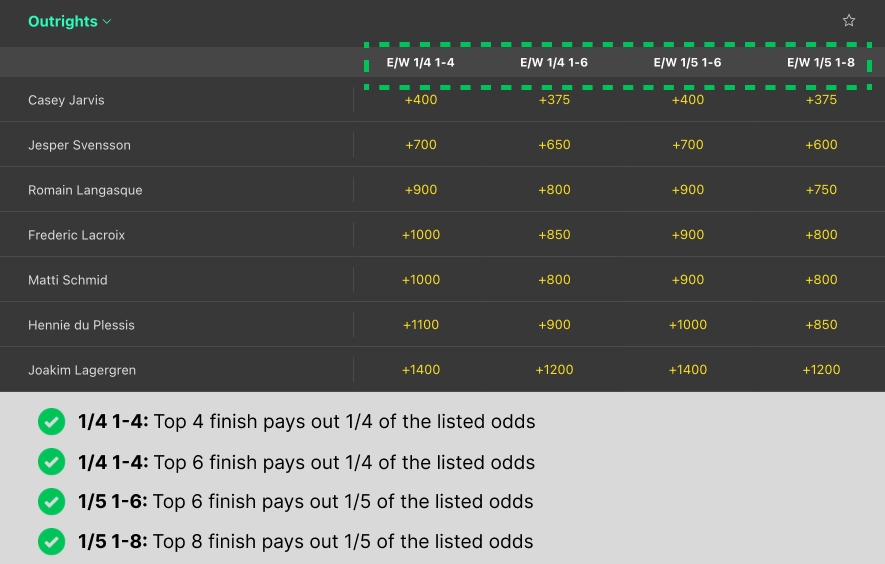
You may be wondering why the first two columns pay the same, despite one option paying finishing positions 1-4 and the other 1-6. The odds will be worse in the second column, so you're getting a reduced payout.
How Are Each-Way Odds Calculated?
Each-way bets are adjusted algorithmically based on a number of factors, primarily field size and probability to win.
Before most golf tournaments with 150+ golfers, you'll get 1/4 of the odds for finishing top 5. But if you're betting a 20-man Formula 1 race, the book will only pay out spots Top 2 at 1/3 of the odds.
The same idea applies to a golf tournament that's already underway. If Jon Rahm has a three-shot lead over second place and a seven-shot lead over sixth place entering Sunday, he's a near-lock to finish top 5, so the book isn't going to let you bet him to place 1-5 at a quarter of the odds like it would have before the tournament.
What About Ties?
Dead-heat rules do apply to each-way bets. And you can't bet golf without knowing about those rules. At most sportsbooks, your bet will be chopped if a player ties for the final spot on a finishing position bet.
If you bet Dylan Frittelli each-way at the 2021 Masters, you'd have a ticket on him to win at 200-1 and a top 5 bet at 40-1. But the each-way portion of your bet would have only paid out 20-1 since he tied for fifth with Rory McIlroy.
(Unless you bet it at BetMGM, which pays out all ties in full, but they don't offer each-way betting).
Should I Bet Each-Way?
It depends on the event, your risk tolerance, and what kind of betting you like to do. In large-field events with as much randomness as golf, where it's tough to price everyone accurately, it can be a fun betting option. It's also an easy way to get some exposure on longshots, particularly in a market like first round leaders, without them needing to actually win.
If your book doesn't offer each-way, you can bet half your stake on the golfer winning and half on a top 5 to simulate an each-way.
When you're done brushing up on each-way bets, take a look at9 Common Sports Betting Mistakes to Avoid.





